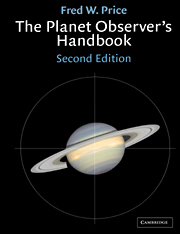Book contents
- Frontmatter
- Contents
- Foreword
- Preface
- Acknowledgements
- Abbreviations used in this book
- Introduction: Why observe the planets?
- 1 The Solar System
- 2 The celestial sphere
- 3 Telescopes and accessories
- 4 The atmosphere and seeing
- 5 Mercury
- 6 Venus
- 7 Mars
- 8 The minor planets (asteroids)
- 9 Jupiter
- 10 Saturn
- 11 Uranus
- 12 Neptune
- 13 Pluto
- 14 Constructing maps and planispheres
- 15 Planetary photography and videography
- 16 Photoelectric photometry of the minor planets, planets and their satellites
- Appendix: Milestones in Solar System exploration
- Name index
- Subject index
Introduction: Why observe the planets?
Published online by Cambridge University Press: 05 August 2012
- Frontmatter
- Contents
- Foreword
- Preface
- Acknowledgements
- Abbreviations used in this book
- Introduction: Why observe the planets?
- 1 The Solar System
- 2 The celestial sphere
- 3 Telescopes and accessories
- 4 The atmosphere and seeing
- 5 Mercury
- 6 Venus
- 7 Mars
- 8 The minor planets (asteroids)
- 9 Jupiter
- 10 Saturn
- 11 Uranus
- 12 Neptune
- 13 Pluto
- 14 Constructing maps and planispheres
- 15 Planetary photography and videography
- 16 Photoelectric photometry of the minor planets, planets and their satellites
- Appendix: Milestones in Solar System exploration
- Name index
- Subject index
Summary
Astronomy has always been a popular hobby with all kinds of people, especially since the arrival of the ‘Space Age’. Telescope sales are brisk and books on astronomy abound. Astronomy is a hobby that can be enjoyed even if the only optical instrument that you have is a pair of binoculars or a very small telescope. Books have even been written on naked eye astronomy.
There is something for everyone in observational astronomy. Some like to study either the Sun or Moon, which are especially suitable for those owning only modest telescopic equipment. Others prefer ‘deep sky’ observing and love to probe the depths of space with the largest telescopes that they can afford and enjoy the satisfaction of locating and identifying bright and faint star clusters, galaxies and nebulae that abound in our universe. Still others like to hunt for comets or keep track of the brightness changes in variable stars, or plot the paths of meteors (‘shooting stars’). Many who are also keen photographers couple their cameras to their telescopes and delight in taking portraits of their favourite celestial objects.
To those who enjoy deep sky observing and the mind-boggling immensities of outer space, planetary observing must seem a little tame. The planets of the Solar System must seem like mere pebbles in their back yards when compared to the immensities of the universe beyond the Solar System.
- Type
- Chapter
- Information
- The Planet Observer's Handbook , pp. 1 - 3Publisher: Cambridge University PressPrint publication year: 2000



